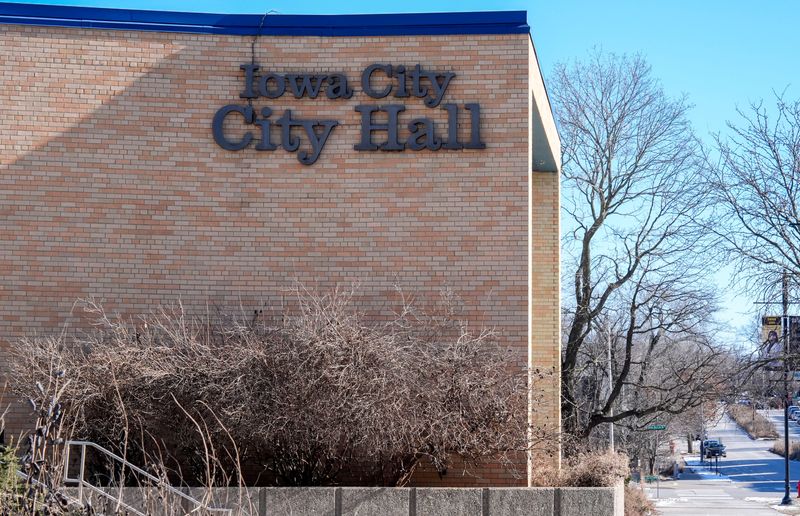The Iowa City City Council is considering a local option sales tax that they believe could generate $10 million in annual revenue.

Assistant City Manager Kirk Lehmann presented the proposed 1% tax per transaction on Tuesday, June 3, and councilors appeared inclined to continue exploring the tax.
The city would likely have to adopt a resolution by August 19 outlining the purpose of the tax for it to appear on the 2025 election ballots.
Here’s what to know:
What would be taxed and what would Iowa City gain from the taxes?
The local option sales tax would apply to about $1 billion in purchases made throughout the city annually, though Lehmann said “life necessities” would be exempt. “”Life necessities” would include groceries, rent or mortgages, utilities, vehicle purchases, gas, motels or hotels and prescription drugs and other health products.
City staff estimated that the 1% tax would generate $8-$10 million in additional revenue each year for Iowa City. Lehmann said it’s a “conservative” estimate because, though online purchases are subject to the tax, they were not included.
What could Iowa City’s local option sales tax revenue be used for?
Several large cities in Iowa use a local option sales tax for the same few reasons, Lehmann said. As of 2019, Iowa law requires that at least 50% of the tax be used for residential “property tax relief.”
In other large cities, the revenue is specifically set aside for infrastructure and capital improvements, street-related repairs and city facility management.
Lehmann said that sales taxes are “volatile” based on economic conditions, and staff would not recommend using revenue for operational costs.
What might the local option sales tax be used for?
Iowa City could use the revenue on infrastructure through the pavement management program and for public facilities, like renovations at the Senior Center, the rec center, and the city hall. They may also consider using money for the construction of a new, joint public safety center.
A public survey revealed that 72% of respondents would like to see the tax revenue used for further investment in streets, bridges and sidewalks. Sixty-nine percent supported an investment in affordable housing.
The council has not yet specified or finalized any plans for its preferred use of the tax dollars or whether the tax would have a set end date.
Staff recommended using 50% of the revenue for property taxes, 20% for housing, 20% for streets, parks and public facilities and 10% for community partnerships.
Lehmann said this was “just a starting point.”
What steps does Iowa City need to take for a local option sales tax?
If a simple majority of Iowa City residents vote to approve the local option sales tax, it would take effect on July 1, 2026.
Language on the ballot is required to describe the types of projects being pursued with the additional revenue generated by the sales tax.
Do other cities in the area have a local option sales tax?
Local option sales taxes appear in more than 1,000 jurisdictions across the state, about 93%, according to Iowa City staff estimates. The only two cities with populations over 50,000 that do not have a local option sales tax are Iowa City and Ankeny.
Coralville and North Liberty do not currently have local option sales taxes.
University Heights voters recently passed a measure approving a 1% tax in that area. Fifty percent is used for property tax relief and the other half will be used for “any lawful purpose.” Tiffin’s measure, which passed in 2024, contains the same provisions.
Has Iowa City had a local option sales tax before?
The city collected $34 million through a local option sales tax between 2010 and 2013 to fund flood mitigation projects, which included the Dubuque Street reconstruction, work on Riverfront Crossings Park and the expansion of the South Wastewater Treatment Facility.
In 2014, the city held a countywide vote on whether to continue the tax, required under state law at the time. The city outlined plans to use 50% of the funds for streets and trails, 40% for property tax relief and 10% for affordable housing.
A narrow majority of Iowa Citians approved the measure. But, state law at the time required majorities in the contiguous cities to approve the tax, and only 46% of those residents voted in favor.
(This story has been updated to fix an inaccuracy.)
Ryan Hansen covers local government and crime for the Press-Citizen. He can be reached at rhansen@press-citizen.com or on X, formerly known as Twitter, @ryanhansen01.
This article originally appeared on Iowa City Press-Citizen: Iowa City explores 1% local option sales tax that could generate $10M annually. What to know:
Reporting by Ryan Hansen, Iowa City Press-Citizen / Iowa City Press-Citizen
USA TODAY Network via Reuters Connect


